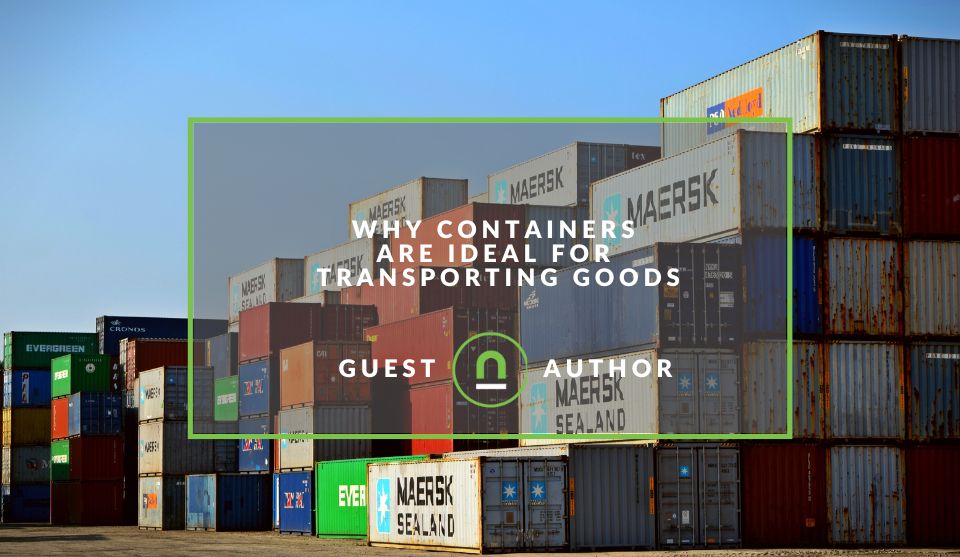Recent posts

nichemarket Advice
Alternative Apps To Try Now That TikTok Has Been Banned
19 January 2025

Industry Experts
Top Trends in Digital Signage for South African SMEs
15 January 2025

Industry Experts
Grow Your Profile With Cheap Instagram Followers
14 January 2025

nichemarket Advice
What Is Amazon Retail Advertising Service?
11 January 2025
Popular posts
Extravaganza
Trending Music Hashtags To Get Your Posts Noticed
24 August 2018
Geek Chic
How To Fix iPhone/iPad Only Charging In Certain Positions
05 July 2020
Extravaganza
Trending Wedding Hashtags To Get Your Posts Noticed
18 September 2018
Money Talks
How To Find Coupons & Vouchers Online In South Africa
28 March 2019
Why Containers Are Ideal For Transporting Goods
14 September 2022 | 9 comments | Posted by Pete Campbell in Hit the Road
Once a novel concept, freight containers can now be seen everywhere and are an integral part of the modern logistics and transport sector. Over the years, the humble box made of corrugated steel has transformed into a convenient and efficient intermodal transport unit capable of being carried on ships, rail, and road.
These heavy-duty transportation units come in standard sizes and are manufactured using Corten steel, a special kind of steel that can withstand the elements without damage and corrosion. These shipping containers come in various configurations and standard sizes to facilitate handling and transport. Some of the top advantages of shipping containers include:
High flexibility
Shippers can use containers to transport a large variety of cargo ranging from agricultural produce to minerals and metals, food, machinery, furniture, electronics, appliances, and whatever else you care to name. They can also transport bulky items, things in awkward sizes, or Out-of-Gauge cargo (OOG) on platform containers. Refrigerated containers or reefers can carry temperature-sensitive cargo, like medicines and perishable foods. They can carry some non-hazardous liquid cargo in flexitanks, which are containers with large flexible bags.
Easy freight management
Booking a full container load or FCL is the most convenient method of transporting your cargo by ship or multimodal transport. It is also faster and cheaper than Less-than Container Loads (LCL) if you have enough goods to fill a container. Since each container is an identifiable unit, shippers, liners, and freight forwarders can use a number of advanced track and trace systems to keep tabs on it as it moves through various stages to its final destination. All the parties involved in the transport also use the container number to verify the cargo.
More economical transportation
As container ships become larger and more powerful, the cost of transporting containers keeps dipping. According to experts, the cost of shipping cargo in containers is much less than the cost of transporting dry bulk cargo. Modern port infrastructure and container handling equipment with an updated container terminal system make container transport cheaper than any other alternative.
The standardisation of container types and sizes allows for better and more efficient operation of the material handling equipment, resulting in faster turnaround times and economies of scale. Another reason for container shipping to work out cheaper is that the containers are durable. According to Marine Insights, containers have a service life ranging from 10-25 years before they need replacement.
Enhanced safety and security
One of the biggest concerns of businesses shipping goods to distant markets is safety and security. A container provides a safe and sound environment for the cargo and prevents the contents from getting wet and getting damaged due to rough handling. Moreover, you can install locks on the door that deters pilferage and tampering.
Durability
Depending on the usage and the way containers are handled, you can extend the lifespan of one shipping container from 10 to 25 years. That gives you a pretty substantial amount of time to earn a return on investment once you purchase the container. If you cannot break even over 10 - 25 years, then it shouldn't be a reflection of the container but rather the business you're operating in.
Containers can be refurbished
Once your container has hit its lifespan, it doesn't mean you'll be sitting with a white elephant that you need to dump or sits in your lot, taking up space and costing you money. There is now a bustling second-hand market for containers where they are repurposed. The practice of refurbishing and using old containers as living quarters and temporary housing, or extensions of homes, is gaining popularity the world over. It is inexpensive to set up, while at the same time, they look stylish when done correctly and aesthetically.
Standardisation
Since ISO-certified containers are of standard size and dimensions, they can be handled universally by any standard transport. This makes it easier to maximise the amount of space in a container; you can calculate the loads it can take and factor in the most effective ways to fulfil transport orders using your containers.
This standardisation can help you build robust pricing models that not only suit clients but help you maximise profitability when accepting a shipping order.
Transporting ability
A follow-up on standardisation means transporting is very rarely an issue; containers can be added to trucks, ships and even rail transport where needed; this means containers can be used on different transport routes, so you can factor in the most cost-effective route for moving these shipments around the world. This means goods can reach places where they would normally be tough to deliver, and you can deliver in bulk, making it cheaper for clients but allowing you to charge a premium as you cut down on costs of transport by picking the most affordable routes.
Conclusion
Using containers represents a cheap and convenient method of shipping cargo. The availability of various container types and sizes makes it easier to optimise your load and carry the maximum possible volume of freight. You can maintain high visibility of your cargo using sophisticated tracking systems, allowing you to plan logistics better and keep customers happier.
Tell us your story
Would you like to write for nichemarket just like Pete has? Find out how to submit a guest post and when you're ready, you can contact us.
Are you looking to promote your business?
South African logistics businesses and freelancers can create your free business listing on nichemarket. The more information you provide about your business, the easier it will be for your customers to find you online.
Registering with nichemarket is easy; all you will need to do is head over to our sign-up form and follow the instructions. If you require a more detailed guide on how to create your profile or your listing, then we highly recommend you check out the following articles.
Recommended reading
If you enjoyed this post and have time to spare, why not check out these related posts and dive deeper down the rabbit hole that is logistics.
- How Blockchain Can Improve The Transportation Industry
- Small Business Strategies for Cargo Tracking & Asset Management
- How Blockchain Can Improve The Transportation Industry
- What Are Truck Driver Rights in the USA
- 5 Rules To Follow When Working With Bow Shackles
You might also like
What Is Amazon Retail Advertising Service?
11 January 2025
Posted by Che Kohler in nichemarket Advice
Amazon is opening up its ad tech to other major retailers with its new Advertising platform, which allows other sites to run sponsored ads on their o...
Read moreHow Link Building Works for E-Commerce Businesses?
28 December 2024
Posted by Marie Hall in Industry Experts
Building backlinks acts as endorsements, signalling to search engines like Google that your website is a credible and valuable resource and it can im...
Read more{{comment.sUserName}}
{{comment.iDayLastEdit}} day ago
{{comment.iDayLastEdit}} days ago
 {{blogcategory.sCategoryName}}
{{blogcategory.sCategoryName}}

